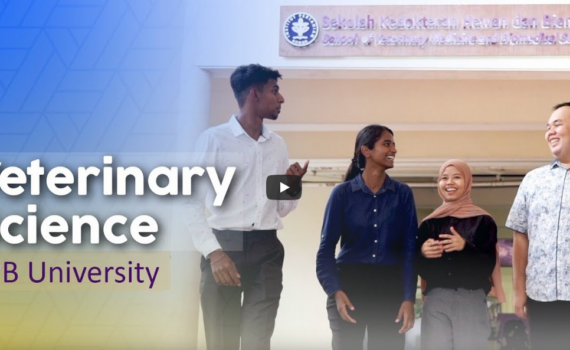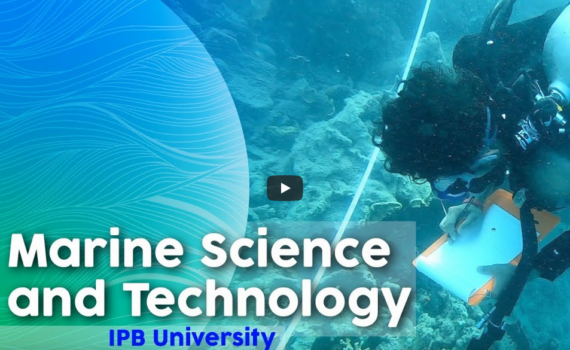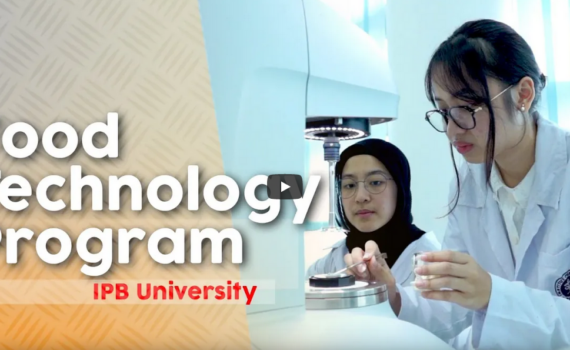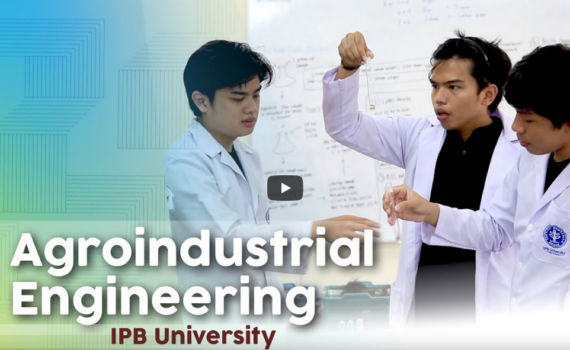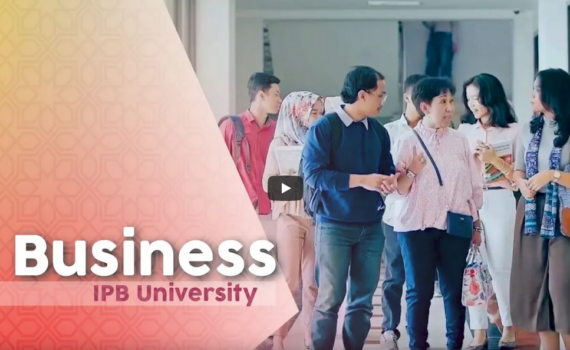International Undergraduate Programs
Student exchange information can be seen in our brochures:
Smart Agriculture 🆕
Learning Outcomes
- Able to apply and utilize science and technology in the field of smart agriculture in solving problems and adapting to the situation at hand.
- Mastering theoretical and technical concepts in the field of smart agriculture in depth for problem solving.
- Able to make the right decisions and provide alternative solutions in accordance with the analysis of textual and spatial data information.
For further information please download our booklet.
Veterinary Medicine
Learning Outcomes
- Able to explain and apply biomedical science and technology and categorize healthy and sick animals, based on anatomical-physiological features, clinical symptoms, pathological changes, and laboratory diagnostic techniques appropriately.
- Able to explain the control, eradication, and treatment of diseases and zoonoses, promotion of animal health and welfare, and ensuring the safety and quality of animal products appropriately.
- Master the concepts of animal structure, animal health, laboratory diagnostics, zoonotic diseases to work as researchers, educators, quality assurance, quality control, entrepreneurs, bureaucrats/government officials.
- Have a leadership spirit, entrepreneurial ability, able to communicate, persistent, and responsible for work independently and in groups respect clients and work teams, and have high spirituality and commitment.
For further information, please download our booklet.
Marine Science Technology
Learning Outcomes
- Mastering theoretical concepts in the fields of marine hydrobiology, oceanography, underwater acoustics, marine instrumentation and robotics, remote sensing, and information systems, as well as artificial intelligence for problem solving about marine resources and environment.
- Apply the latest marine science and technology in order to explore marine resources and environment and contribute to growing the blue economy;
- To initiate innovations for exploration, development of marine utilization and advancement, and sustainable development.
For further information, please download our booklet.
Food Science and Technology
Learning Outcomes
- Have knowledge of food science principles (chemistry and food analysis, food microbiology, food safety, food engineering and processing, food biochemistry and nutrition and applied food science including sensory science, quality assurance, and food laws and regulations).
- Be able to apply the principles of food science and technology holistically to produce safe and quality foods.
- Be able to communicate orally and in writing related to technical and nontechnical aspects of food production
- Be able to think critically, solve problems, be responsible for his/her work
independently, and make appropriate decisions based on the available information. - Be able to work in a team with different backgrounds, adaptive, and
responsive to the different situation. - Committed to professionalism and ethical values.
For further information, please download our booklet.
Agro-Industrial Engineering
Learning Outcomes
- Able to identify, analyze, and solve agro-industrial engineering problems, which include systems, processes, management and the environment, through the application of knowledge of mathematics, science, engineering and information technology using modern techniques and tools.
- Able to design agro-industrial systems/components, processes and products to meet desired needs within realistic constraints.
- Able to design and carry out scientific and engineering experiments and analyze and interpret the resulting data.
- Able to realize the importance and have the ability to engage in life long learning.
- Able to communicate effectively in writing and orally.
- Able to play an effective role in multidisciplinary and multicultural teams.
- Able to understand the application of ethics and professionalism in solving agro-industrial engineering problems in the context of economy, environment, society and other contemporary issues.
- Able to transform science and technology-based ideas into agroindustry business concepts (technopreneurs).
For further information, please download our booklet.
Biology
Learning Outcomes
- Able to make appropriate decisions based on data and information analysis, and able to provide guidance in choosing various alternative solutions independently and in groups in the fields of biodiversity, environment, and biotechnology.
- Mastering theoretical concepts in the field of biology in general and theoretical concepts in the fields of biodiversity, environment and biotechnology and able to formulate procedural problem solving based on theoretical concepts mastered.
- Able to apply biological expertise and utilize science and technology in problem solving in the fields of biodiversity, environment, and biotechnology and be able to adapt to the situation at hand.
- Able to apply scientific values and values contained in state agreements in life.
- To be an agile, collaborative, and adaptive individual to change.
- Become a lifelong learner
- Able to take responsibility for one’s own work in the field of Biology and can be given responsibility for the achievement of the work of his/her organization
- Able to self-evaluate, manage one’s own learning, effectively communicate information and ideas in various forms of media as appropriate.
For further information, please download our booklet.
Chemistry
Learning Outcomes
- Able to relate the structure and the universe systematically through observation and experimentation that utilizes science and technology as an application of basic science including mathematics, physics, chemistry, and biology.
- Able to describe the theoretical concepts of structure, properties, and changes in kinetics and thermodynamics, identification, separation, characterization, transformation, material synthesis, and their applications.
- Able to use material knowledge and develop management systems that have been implemented in industry widely, including ISO, HACCP, K3, halal assurance systems.
- Able to organize standard operations of the function and operation of chemical instruments, and analyze data and information to produce appropriate conclusions.
- Able to use software for analysis, synthesis, and molecular modeling in the field of chemistry.
- Able to demonstrate good practical work in the laboratory to support theoretical aspects by paying attention to safety, occupational health, and environmental aspects.
- Able to solve science and technology problems in the field of chemistry including identification, analysis, isolation, transformation, and synthesis of simple materials through the application of knowledge of structure, properties, molecular changes, kinetics and thermodynamics.
- Able to show an attitude of devotion to God Almighty; uphold human values; contribute to improving the quality of community life; proud and love the country; appreciate diversity; able to work together; law-abiding and disciplined; internalize values, norms, and ethics; responsible; internalize the spirit of independence, struggle, and entrepreneurship.
- Able to communicate orally and in scientific writing; interpret, process, and present data; demonstrate skills in numeracy and mathematical thinking; demonstrate skills in problem solving; demonstrate an attitude of ethical responsibilities; do sourcing information, team working, and time management well; demonstrate soft skills such as organizational skills, creativity, and leadership “
For further information, please download our booklet.
Management
Learning Outcomes
- Able to communicate effectively both orally and in writing, build commitment, demonstrate professional integrity, ethics, and work independently or as part of a team in various situations.
- Capable of applying various management methods/tools and information technology to solve organizational problems with a perspective of sustainable development.
- Capable of developing objective, independent, critical, and systematic thinking, as well as creative and innovative thinking, by developing sociotechnopreneurship skills.
- Capable of applying management functions including marketing, production-operations, finance, and human resources in accordance with current management principles within the context of organizational management.
- Capable of making decisions, problem-solving, and managing risks through value creation in facing an uncertain business environment.
- Capable of implementing integrated strategic management within the framework of digital transformation and its institutions.
- Capable of competing, excelling, and adapting at the national and global levels.
For further information, please download our booklet.
Agribusiness
Learning Outcomes
- Able to think critically in order to solve tropical agribusiness
- Able to identify and analyze domestic and global tropical agribusiness environment
- Able to communicate and present business idea effectively and convincingly in the form of writing and orally
- Able to construct business plan in tropical agribusiness
- Able to identify agribusiness system from various point of view
- Able to understand and ethical perspective on tropical agribusiness environment
- Having the ability in data, technological and human literacy
- Having the creativity, entrepreneurship and leadership in tropical agribusiness
- Able to work and produce individually and team
For further information, please download our booklet.
Resource and Environmental Economics
Learning Outcomes
Attitude
- Have faith in God Almighty and be able to show a religious attitude
- Upholding human values in carrying out duties based on religion, morals and ethics
- Contribute to improving the quality of life in society, nation, state and civilization based on Pancasila
- Acting as a citizen who is proud and loves the country, has nationalism and a sense of responsibility to the state and nation
- Respect the diversity of cultures, views, religions and beliefs, as well as the original opinions or findings of others;
- Working together and having social sensitivity and concern for society and the environment;
- Obey the law and be disciplined in social and state life
- Internalize academic values, norms and ethics;
- Demonstrate a responsible attitude towards work in their field of expertise independently;
- Internalize the spirit of independence, struggle and entrepreneurship
General Skills
- Able to apply logical, critical, systematic and innovative thinking in the context of developing or implementing science and technology that pays attention to and applies humanities values appropriate to their field of expertise;
- Able to demonstrate independent, quality and measurable performance;
- Able to study the implications of the development or implementation of science and technology by paying attention to and applying humanities values according to their expertise based on scientific rules, procedures and ethics in order to produce solutions, ideas, designs or art criticism;
- Able to compile a scientific description of the results of the study above in the form of a thesis or final assignment report, and upload it on the university website;
- Able to make appropriate decisions in the context of solving problems in their field of expertise, based on the results of information and data analysis;
- Able to maintain and develop working networks with supervisors, colleagues, colleagues both inside and outside the institution.
- Able to be responsible for the achievement of group work results and supervise and evaluate the completion of work assigned to workers under his/her responsibility;
- Able to carry out a self-evaluation process for work groups under their responsibility, and able to manage learning independently;
- Able to document, store, secure and retrieve data to ensure validity and prevent plagiarism;
- Able to use the Internet of Things for learning activities and completing work
Knowledge
- Mastering economic concepts in the fields of agriculture, resources and the environment.
- Mastering the concepts of natural science and socio-economics in the fields of agriculture, resources and the environment.
- Have knowledge of technical aspects in the fields of agriculture, resources and the environment.
- Mastering knowledge about analytical methods in the fields of agricultural economics, resources and the environment.
Special Skills
- Able to interpret sustainable agricultural, resource and environmental management using qualitative and quantitative approaches appropriately in the public sector
- Able to solve problems in the fields of agricultural economics, resources and the environment comprehensively for the development of these three fields in the future
- Able to accurately assess the characteristics of renewable and non-renewable natural resources that support ecosystem sustainability
- Able to solve economic problems through an effective and efficient optimization approach in the agricultural and resource sectors
- Applying various economic efficiency theories to comprehensively support entrepreneurship activities in the business sector
- Applying various marketing and trade concepts to support the development of agriculture, resources and the environment globally
- Able to calculate the extraction of renewable and non-renewable resources in a sustainable manner based on economic, social and institutional parameters
- Able to apply economic calculations for resources and the environment using appropriate and systematic economic valuation techniques in the fields of agriculture, resources and the environment
- Able to analyze various sustainable agricultural development policies comprehensively
- Able to analyze the feasibility of agricultural projects, resources and the environment using a comprehensive economic analysis approach
- Able to analyze the economic value of damage using a precise and systematic economic approach in the fields of resources and the environment
- Create simple mathematical modeling designs for systematic and dynamic management of agriculture, natural resources and the environment
- Resolving institutional problems in agricultural, resource and environmental management with an efficient institutional economics approach
For further information, please download our booklet.
Islamic Economic
Learning Outcomes
- Master the basic concepts of Islamic economy, both microeconomics and macroeconomics in Islamic perspectives in problem solving and decision making related to economic development and improving people’s well-being. (Knowledge).
- Able to apply and develop his expertise in solving problems related to Sharia, monetary finance and Islamic business; and have analytical skills and adaptation to the situation at hand. (Field of Work – Attitudes and Skills).
- Able to provide a variety of alternative solutions in the right decision making and policies based on Islamic economic theory and analytical tools owned, both independently and group. (Managerial Skills – General and Specialized Skills)
For further information, please download our booklet.
Business
Learning Outcomes
- Capable of identifying and recognizing business opportunities
- Capable of mastering business and entrepreneurship knowledge to organize
system and innovative business model - Capable of formulating a proper business plan
- Capable in understanding and articulating the concept and thought in business problem-solving, both strategic and operational
- Capable of integrating information, theories, and best practices into the analysis of new business organization’s problems or strengthening the competitiveness of the existing business organization in facing global competition.
- Capable of using decision-support tools required in solving business problems
- Capable of showing dynamic leadership quality in performing various business organization functions
- Capable of working together in a team effectively
- Capable of communicating arguments effectively in verbal and written format to multiple stakeholders
- Capable of understanding the role of innovation in creating sustainable value added
- Capable of understanding and performing business that considers moral and
ethical values - Capable of balancing the interest of many stakeholders to guarantee business sustainability
For further information, please download our booklet.

